Explore our diverse range of Waste Containers, Bins & Equipment
Waste comes in all sizes, and so does our equipment. Our range of waste bins and containers is designed to cater for all your waste management needs and handle different waste streams effectively regardless of their size or form. From skip bins to recycling bins, from general waste to electronic waste, we have the perfect bin to suit your specific requirements. Get in touch with our experts by filling out this form.
-
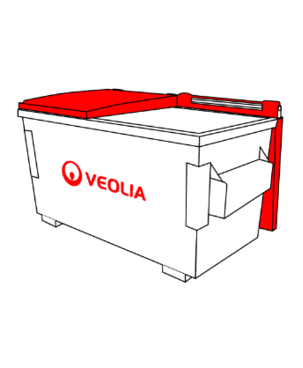 Front LiftLearn more
Front LiftLearn moreWhat is a Front Lift bin?
Front lift bins are mobile steel bins, with plastic lids that have been coloured coded to suit different waste / recyclable types. They are suitable for easily accessible sites with storage areas and also for large volumes of the streams mentioned above. If required we have lockable bars and chains available for our front lift bins.What are standard Front Lift bin sizes?
Standard sizes range from 1.5 to 4.5 cubic meters.
Sizes may differ in each state. Please contact our customer service team to discover which bin size best meets your requirements.Which waste types are typically collected in Front Lift bins?
Waste types typically collected include:- General Waste
- Paper and cardboard
- Mixed Recycling
- Food organics and Organics
-
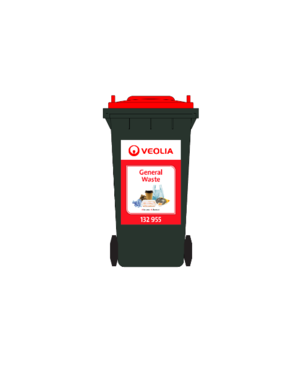 Rear LiftLearn more
Rear LiftLearn moreWhat is a rear lift bin?
Rear lift bins are lightweight, mobile, hard plastic and easy to use. They can be secured with lockable lids or a "Master Key" padlocking system for further security. Rear lift bins are ideal for sites with limited storage capacity and access restrictions, as well as small volumes of waste.What are standard rear lift bin sizes?
Standard sizes range from 120 to 1100 litres..
Sizes may differ in each state. Please contact our customer service team to discover which bin size best meets your requirements.
Which waste types are typically collected in Rear Lift bins?
Waste types typically collected include:- General Waste
- Paper and Cardboard
- Mixed Recycling
- Glass
- Soft Plastics
- Confidential Paper & media destruction
- Food Organics
- Garden Waste
- Sharps
- E-waste
-
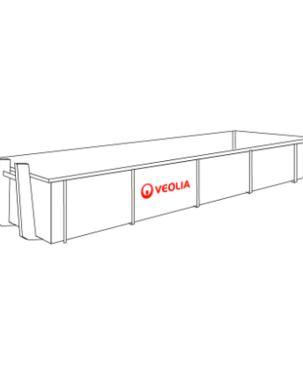 Hook BinLearn more
Hook BinLearn moreWhat is a hook bin?
A hook bin is a large stationary unit made out of heavy duty steel. They are suitable for large volumes of dry general waste and recyclables, and there should be no access issues to the site.What are standard hook bin sizes?
Standard sizes range from 8 to 35 cubic metres.
Sizes may differ in each state. Please contact our customer service team to discover which bin size best meets your requirements.Which waste types are typically collected in Hook bins?
Waste types typically collected include:- General Waste
- Cardboard
- Plastics
- Soil
- Metal Construction Waste
- Secure Deep Burial
- Timber
-
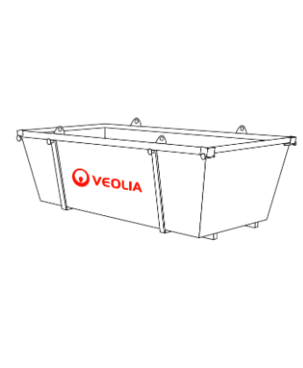 Skip BinLearn more
Skip BinLearn moreWhat is a skip bin?
Skip bins are made out of heavy duty steel and require a permit if placed on public property. This bin can only be transported via marrell and skip bulk trucks.Skip bins are ideal for heavy waste materials and are suitable for sites with limited access. Small volumes of dry bulk waste and recyclables generally warrant skip bins.
What are standard skip bin sizes?
Standard sizes range from 2 to 6 cubic metres.
Sizes may differ in each state. Please contact our customer service team to discover which bin size best meets your requirements.Which waste types are typically collected in skip bins?
Waste types typically collected include:- General (mixed) waste
- Commingled – glass, plastic, bottles, aluminium and steel cans
- Construction and demolition
Located in the Gold Coast or Brisbane area? You can learn more about our skip bin service or get an instant quote here.
-
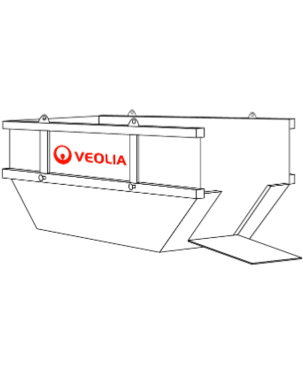 Marrell BinLearn more
Marrell BinLearn moreWhat is a marrell bin?
A Marrell bin is a medium to large sized stationary unit, ideal for large volumes of dry bulk waste and recyclables are suitable for sites with limited access.What are standard marrell bin sizes?
Standard sizes range from 6 to 15 cubic metres.
Sizes may differ in each state. Please contact our customer service team to discover which bin size best meets your requirements.Which waste types are typically collected in Marrell bins?
Waste types typically collected include:- General Waste
- Cardboard
- Plastics
- Soil
- Metal Construction Waste
- Secure Deep Burial
- Timber
-
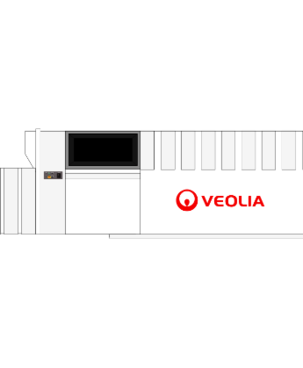 CompactorLearn more
CompactorLearn moreWhat is a compactor?
A compactor is a large stationary unit made out of heavy duty steel. They are ideal for large volumes of dry and wet general waste and recyclables and are suitable for large storage areas without access limitations. Accessories such as bin lifters and pre-crushers are common.What is standard compactor size?
Standard sizes range from 5 to 35 cubic metres.
Sizes may differ in each state. Please contact our customer service team to discover which bin size best meets your requirements.Which waste types are typically collected in compactors?
- Dry and wet general (mixed) waste
- Paper and cardboard
- Commingled – glass, plastic, bottles, aluminium and steel cans
-
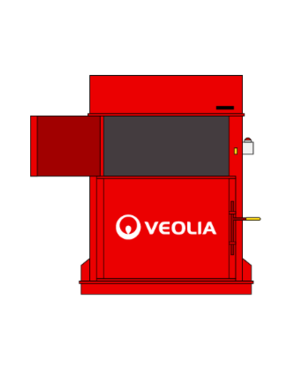 BalerLearn more
BalerLearn moreWhat is a baler?
A baler is a smaller stationary unit made out of heavy duty steel suitable for baled volumes of recyclables. Automatic balers are mainly for plastics (HDPE & LDPE), cardboard and aluminium.As part of our Always Safe program, we provide operator training and safe work instructions upon installation.
What are standard baler sizes?
Standard sizes range from 50 to 550 kilograms.
Which waste types are typically collected in baler?- LDPE (Shrink/Pallet Wrap)
- Commingled – glass, plastic, bottles, aluminium and steel cans.
- Cardboard
-
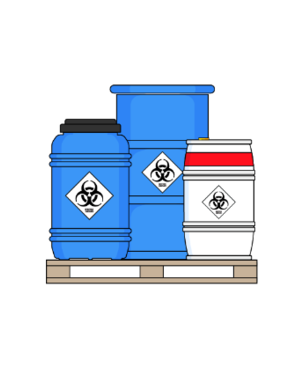 Drums, Containers & IBC’sLearn more
Drums, Containers & IBC’sLearn moreWhat is a drum?
Drums and containers are generally used for hazardous liquid wastes, transported via a flatbed truck and are suitable for sites with limited storage spaceWhat are standard drum and container sizes?
Standard sizes range from 10 to 205 litres.What is an IBC?
IBC’s, also known as intermediate bulk containers either metal, plastic or both versatile containers with an integrated pallet base mount that provides forklift and/or pallet jack manoeuvrability. They are commonly used to store industrial liquids or hazardous chemicals.What is a standard size for an IBC?
A standard industry for an IBC is 1,000L.Which waste types are typically collected in drums and containers?
- Liquid wastes, typically hazardous
-
 Medical BinsLearn more
Medical BinsLearn moreVeolia successfully provides safe, convenient, eco-friendly, and cost-effective reusable sharps and clinical waste management services to hospitals and other high volume waste generating facilities.
To learn more about our medical waste equipment click here.
-
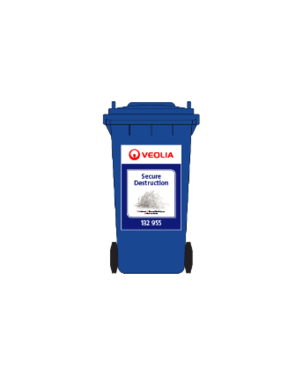 Confidential BinsLearn more
Confidential BinsLearn moreWhat is a confidential bin?
A confidential bin is typically used for customers who require secure disposal of confidential documents. All confidential and secured waste are delivered to and disposed of in a facility that is licensed to receive this type of material.What is a standard confidential bin size?
A standard confidential bin size is 50 litres. -
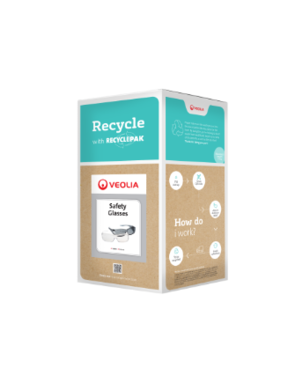 RECYCLEPAK™Learn more
RECYCLEPAK™Learn moreRECYCLEPAK™ prepaid boxes allow you to conveniently recycle your hard to recycle items in a safe and environmentally responsible manner.
We have made recycling easy with a complete door to door solution that includes everything you need: packaging, freight and recycling.
To learn more or order RECYCLEPAK™ click here.
Frequently Asked Questions
How do we keep our equipment and fleet services well-managed and maintained?
Veolia uses routine maintenance programs to maintain our fleet and ensure an uninterrupted supply of services. This includes:
- Daily inspections
- Operational log books kept up to date with performance, collection runs and equipment defects
- Corrective maintenance when required
- Insertion of the defect management and equipment maintenance protocol which allows for fast repair and response times in the case of a defect
- Reactive maintenance in the case of a hazard or loss of functionality
Our routine maintenance database enables the following:
- Tracking of all repair and maintenance activity
- Maintenance trends analysis
- Equipment usage optimisation and contingency planning
What happens to a damaged bin?
Damaged equipment will be reported to and repaired by our fabrication department. To ensure service continuity, we provide our clients with a backup bin. Before returning a repaired bin we must ensure that it meets industry specifications and standards. We also encourage you to notify Veolia if your equipment is damaged to prevent any obstructions to your daily operation.


